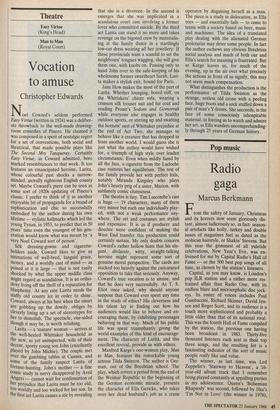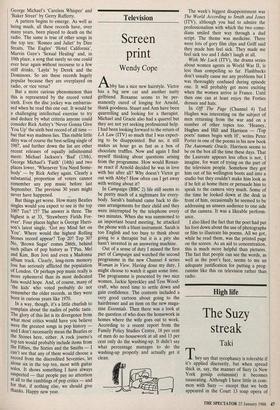Pop music
Radio gaga
Marcus Berkmann
From the safety of January, Christmas and its horrors now seem gloriously dis- tant, almost ludicrously so, in fact: season- al artefacts like holly, turkey and double issues of magazines feel as dated as the mohican hairstyle, or Shakin' Stevens. But this year the grimmest of all yuletide celebrations, New Year's Eve, was en- livened for me by Capital Radio's Hall of Fame — or the 500 best pop songs of all time, as chosen by the station's listeners.
Capital, as you may know, is London's pop ILR station and a rather more res- trained affair than Radio One, with its endless blare and microcephalic disc jock- eys. Its roster of voices includes Paul Gambaccini, Richard Skinner, David Jen- sen and Roger Scott, and its audience is a touch more sophisticated and probably a little older than that of its national rival. This was the fourth Hall of Fame compiled by the station, the previous one having been broadcast in 1983. Thirty-five thousand listeners each sent in their top three songs, and the resulting list is a fascinating indicator of the sort of music people really like and value.
The winner, as last time, was Led Zeppelin's 'Stairway to Heaven', a 16- year-old album track that I remember being played constantly at appalling parties in my adolescence. Queen's 'Bohemian Rhapsody' was second, followed by lOcc's `I'm Not in Love' (the winner in 1978), George Michael's 'Careless Whisper' and `Baker Street' by Gerry Rafferty.
A pattern begins to emerge. As well as being mush, all these records have, over many years, been played to death on the radio. The same is true of other songs in the top ten: `Romeo and Juliet' by Dire Straits, The Eagles' Hotel California', Marvin Gaye's `Sexual Healing' and, in 10th place, a song that surely no one could ever hear again without recourse to a few stiff drinks, 'Layla' by Derek and the Dominoes. So are these records hugely popular because they are overplayed on radio, or vice versa?
But a more curious phenomenon than this is represented by the record voted sixth. Even the disc jockey was embarras- sed when he read this one out. It would be a challenging intellectual exercise to try and deduce by what criteria anyone could consider Rick Astley's 'Never Gonna Give You Up' the sixth best record of all time but that way madness lies. This risible little ditty was of course the best-selling single of 1987, and further down the list are other recent releases of equally infinitesimal merit: Michael Jackson's 'Bad' (13th), George Michael's 'Faith' (14th) and two places lower, 'Whenever You Need Some- body' — by Rick Astley again. Clearly a substantial proportion of voters cannot remember any pop music before last September. The previous 30 years might never have happened. But things get worse. How many Beatles singles would you expect to see in the top 100? Ten? 15? The answer is three. The highest is at 33, 'Strawberry Fields For- ever'. Four places higher is George Harri- son's latest single, 'Got my Mind Set on You'. Where would the highest Rolling Stones record appear? Top 20? Top 30? No, 'Brown Sugar' comes 286th, behind such pillars of pop history as T'Pau, Mel and Kim, Bon Jovi and even a Madonna album track. Clearly, long-term memory loss has seriously afflicted the population of London. Or perhaps pop music really is more ephemeral than its most dedicated fans would hope. And, of course, many of `the kids' who voted probably do not remember the older records, as they were born in curious years like 1970. In a way, though, it's a little churlish to complain about the nadirs of public taste. The glory of this list is its divergence from what most critics would have you believe were the greatest songs in pop history and I don't necessarily mean the Beatles or the Stones here, either. A rock joumo's top ten would probably include items from the Fifties, the Sixties and the Smiths — I can't see that any of them would choose a record from the discredited Seventies, let alone six in the top ten, most with guitar solos. It shows something I have always suspected — that people pay no attention at all to the ramblings of pop critics — and for that, if nothing else, we should give thanks. Happy new year.



























































 Previous page
Previous page